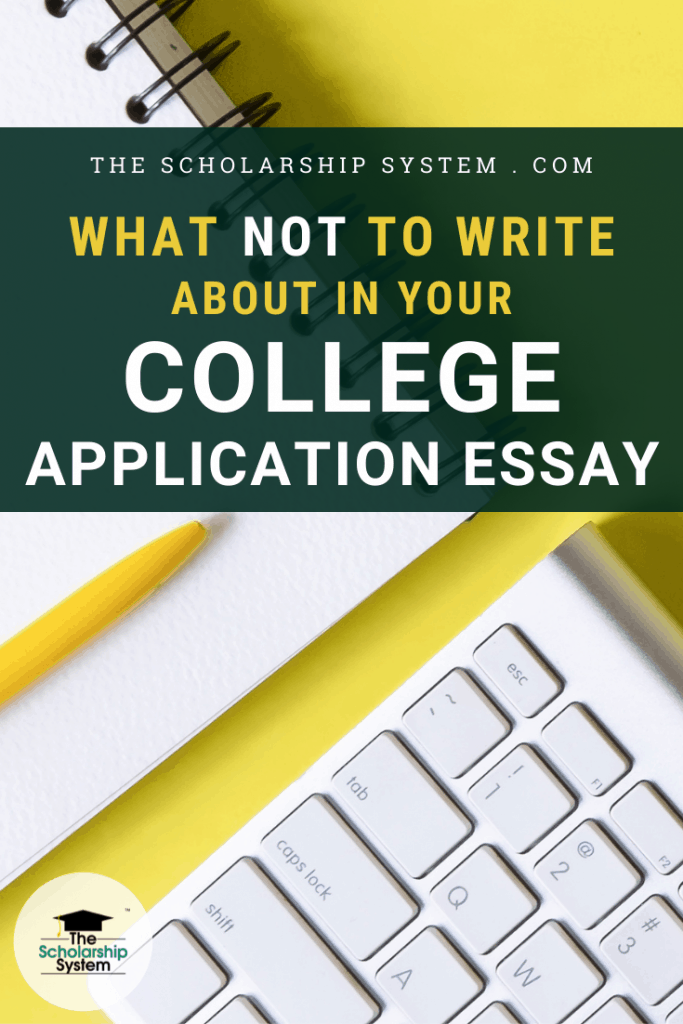Updated on November 24th, 2023
When your student starts applying to college, writing essays usually comes with the territory. Your student may have to respond to the Common App essay prompts or questions created by specific colleges. In either case, they usually have some flexibility about what they discuss. That’s why knowing what not to write about in a college application essay is so important.
If your student is preparing college application essays, why not add scholarship essays to the mix? Scholarships are a great way to make any college more affordable. If you and your student want to learn how to find and land scholarships, sign up for our free college scholarship webinar! Take a quick trip over to http://thescholarshipsystem.com/freewebinar to reserve a spot today.
Making a misstep with a college admissions essay can mean missing out on their dream school. Luckily, many mistakes are easy to avoid once your student knows what they are and why they matter. If your student needs some insights, here’s a look at what not to write in a college application essay.
WHAT NOT TO WRITE ABOUT IN A COLLEGE APPLICATION ESSAY
SENSITIVE, CONTROVERSIAL, OR TABOO SUBJECTS
Certain topics are naturally polarizing. While politics and religion are two of the most obvious subjects that can fall into that category, they certainly aren’t the only ones.
Even if your student is very passionate about the topic, that doesn’t mean it’s good essay material. After all, your student can’t predict which admissions officer will read their essay. If the admissions committee disagrees with your student’s perspective, they may not accept them into the incoming class even if the content is well-written.
In general, when it comes to college admissions essay topics to avoid, it’s best to steer clear of anything sensitive, controversial, or taboo. While your student may perceive this as playing it safe, it’s crucial to remember that their goal is to gain admission. As a result, they need to focus on subjects that increase their odds of making that happen.
It is important to note that what qualifies as sensitive may vary depending on the school your student wants to attend. For example, while discussing a religious topic may not be recommended for most colleges, if your student is applying to a university with a religious affiliation, discussing faith may be acceptable, depending on the angle they take.
A REHASH OF YOUR SCHOOL-RELATED ACHIEVEMENTS
Usually, your student’s college applications and transcripts have an excellent overview of their extracurricular and academic achievements, including GPAs, test scores, courses taken, varsity status, and more. As a result, rehashing those accomplishments in their essay makes the content a bit redundant.
Even if a question asks about academic or school-related achievements, your student shouldn’t just restate what they’ve already shared. If they are going to discuss any of the same events again, they need to add extra depth. That way, they add something new to the story, not just retelling what is already known.
A Summary of a Volunteer Experience or Trip
While it may seem like talking about lengthy volunteer experiences or trips to another country would be a good idea in college admissions essays, summaries of the broader experience fall into the “what not to write in a college admissions essay” category. Often, the resulting story lacks uniqueness. Additionally, it doesn’t leave much space for showcasing why the experience was impactful.
If your student wants to talk about a volunteering experience or a mission trip, they need to drill down into a single moment from that time. Individual people or events that made a difference in their lives or altered how they view the world can be great topics for an essay and are far more unique than the summary approach.
CLICHÉ SPORTS STORIES
While student-athletes may want to discuss a sport-related event from their lives, if the story feels cliché, it may be better to skip it. Many students tell tales about their victories and defeats, the lessons that got them there, or what they learned as a result.
The issue isn’t that those moments aren’t formative experiences. Instead, it’s that many students will share very similar stories. It isn’t a great option for standing out. Essentially, reports of this nature qualify as cliché essay topics. So, unless your student has a unique perspective on the sports story narrative, they may be better off discussing something else.
STORIES ABOUT A BIG PERFORMANCE
An essay focused on a student’s big performance is as problematic as talking about athletics. Discussing the time when they were the lead in a play, had a major music solo, or anything in that vein can feel cliché. Plus, it’s not ideal for helping a student stand out, as many other applicants likely have highly similar stories to tell.
Another issue is that these essays usually spend substantial time describing the performance, audience reactions, and other non-student-centered points. Essentially, the focus isn’t on the student for a significant part of the essay, making it hard for admissions committees to learn what they need to know.
Want to learn more about how your student can write powerful essays to secure college funding? We offer strategies in our free college scholarship webinar! Head over to http://thescholarshipsystem.com/freewebinar to save your seat today.
ILLEGAL ACTIVITIES
While drug addiction, alcohol use, arrests, jail stints, and similar activities may seem intriguing, they are usually college essay topics to avoid. There is a chance the admissions committee won’t view those actions favorably, regardless of the lessons they learned along the way.
Even talking about how they got off a less-than-ideal path might not be smart. Ultimately, it’s risky to admit their participation in those activities, as the college admissions process committee may question your student’s judgment even if they’ve moved forward.
ANYTHING TOO PRIVATE
While a college admissions essay is supposed to help the committee get to know your student, that doesn’t mean they should reveal overly personal details. It may lead the committee to assume your student doesn’t understand boundaries, which isn’t ideal.
Exactly what qualifies as too private can vary. However, topics like bodily functions and sex are usually no-nos. Similarly, graphic descriptions of injuries or illnesses are generally best avoided.
Now, this doesn’t mean that high school seniors can’t discuss sexual orientation, gender identity, or topics in those veins. As long as they are staying away from discussing sexual activities, those subjects can be fine, depending on the kind of school your student wants to attend.
AN ODE TO PRIVILEGE
While many students who grew up with a privileged life likely appreciate that fact, discussing why they are thankful for it isn’t ideal for a college essay. The likelihood that the essay topic will resonate with the admissions committee may be pretty low, and there’s even a chance some will resent what they perceive as a cushier upbringing.
This doesn’t automatically mean fortunate students can’t mention that they came from that position. However, there needs to be more to the college essay topic than just being appreciative of that kind of upbringing.
IMMIGRATING TO ANOTHER COUNTRY
While immigrating to another is certainly a challenging experience and often quite formative, essays about it tend to be highly similar. When discussing the experience, students usually discuss how they felt out of place, had to adapt to a new culture, and had to learn a new language. Since many applicants had the same journey, it can cause the essay to fall flat if a student gives an overview of the entire experience.
If students want to discuss how immigrating shaped them, then they need to identify a unique aspect of their journey to share. If a student can’t find a differentiator, it’s typically best to choose another topic.
FORCING HUMOR
Telling a funny story can be a great way to engage the reader. However, actively trying to be funny when writing college essays doesn’t always work out. Forced humor isn’t always as amusing as your student may think, so that that approach can work against them. It can come across as disingenuous and overly efforted, neither of which is great when writing a college application essay.
If they share an experience that happens to be funny, that’s fine. Sometimes humorous things happen. When it was genuinely amusing, forcing it isn’t necessary. The humor will emerge authentically.
BEING YOUR OWN HERO
If your student is given an essay prompt that asks them to discuss their “hero,” making themselves the star of that story is a horrible idea. It comes across as self-centered bragging, which isn’t likely to impress the admissions committee.
Plus, it leads the committee to think that your student lacks a necessary amount of awareness about being other than themselves. Since teamwork and collaboration are a big part of the college experience, there’s a good chance they’ll view that as a red flag.
AN INFLUENTIAL PERSON OR PLACE
Unless your student is given a specific prompt to discuss their hero or an influential person or place, it’s usually best not to head in this direction. The issue is that talking about people and locations takes the focus off the student.
Even if students spend time talking about why or how the person or place impacted them, they have to dedicate space to describing the person or location. As a result, they miss out on opportunities to focus on what matters to the admissions committee: the student! So, it’s usually best to go in another direction if the prompt doesn’t make this approach necessary.
FRAMING A BAD GRADE AS A CHALLENGE
Many students encounter essay prompts asking them to describe how they overcame a challenge. Sometimes, students may think discussing a time when they received a bad grade is a good way to address the topic.
In reality, framing a single bad grade as a challenge likely won’t help your student’s odds of acceptance. First, many other applicants have far more intriguing or unique examples of overcoming hardships. Second, it highlights a moment when the student’s academic performance was subpar, which isn’t something to flaunt in a college essay, regardless of the outcome.
ROMANTIC RELATIONSHIPS
Regardless of how strongly your student feels about a partner or how impactful a breakup was, writing about romantic relationships in a college admissions essay isn’t typically wise. Some admissions officers may find the topic inappropriate, while others may question its relevancy.
For the latter, the main issue is that when discussing a relationship, the focus is usually on the student’s partner, not the student themselves. As a result, the committee may learn a ton about someone who’s not the applicant, giving them little information to determine whether the student is a worthwhile candidate.
OFF-TOPIC OR NOT-AN-ESSAY ESSAYS
Some students want to break free of the mold and get creative. They might think it’ll help them stand out. The truth is, it very well may, but not necessarily how they expect.
There is a reason that essay topics are set in advance. Choosing to write about a subject that doesn’t align with the question or prompt makes it seem like your student can’t follow directions or that they view themselves as above the requirements, neither of which is good.
Additionally, deviating from the traditional essay format may not be ideal. Turning their answer into a poem or free-writing exercise is incredibly risky. The same can go for using an overly literary approach.
Ultimately, your student should create an essay connecting with the admissions committee and following the directions. That way, they can increase their odds of being invited to join the incoming class.
NEGATIVE PERSPECTIVES ON SCHOOL
Just as it’s bad to badmouth an employer when writing a cover letter for a new job, speaking poorly of school isn’t a wise move when creating a college essay. While discussing a challenge they overcame is fine, criticizing a school or the academic experience just makes your student seem negative and critical.
In many cases, an essay of this nature leads admissions officers to picture your student speaking similarly of their institution. As a result, the odds that they’ll admit your student are incredibly low.
TRAGIC EVENTS THAT ARE HARD TO DISCUSS
In some cases, discussing a tragic event in a college essay can work in a student’s favor, particularly if they can focus on their perspective and how the event changed them. However, if talking about the tragedy is incredibly difficult, covering it isn’t necessarily the best idea.
Writing college essays is stressful on its own. If the topic your student is covering triggers strong, challenging emotions, then the process is even more difficult. It could cause the quality of their writing to decline or make reviewing and editing the piece challenging, as they have to relive the event every time they reread it.
Ultimately, selecting another topic is best if your student experiences strong emotions simply thinking about the tragic event. However, if they can remain poised, this topic could work.
EVENTS THAT OCCURRED BEFORE HIGH SCHOOL
While plenty of formative experiences can happen during childhood and early adolescence, it’s usually best to focus on events that occurred during or after high school when writing college essays. Making situations that happened earlier in their lives a central focus doesn’t help the admissions officers see who the student is today, and that’s potentially problematic.
Now, that doesn’t mean students can touch on an early event at all. However, if they do, they must showcase how the situation impacts them and influences who they are today. That way, the topic’s relevance is clearer.
PARENTAL PRESSURE TO PURSUE THE CHOSEN MAJOR
Getting parental input into majors isn’t inherently problematic. Similarly, students being inspired by their parents to pursue a specific degree isn’t necessarily an issue. However, admitting in an essay that the student selected a major because it’s what their parents wanted is a problem.
When students state they’re focusing on a major due to parental pressure, it makes the student seem like they lack autonomy. Plus, it can indicate that the student isn’t personally passionate about the field. Ultimately, the admissions committee will question whether admitting them is smart. Since that’s the case, it’s best not to openly state that parental pressure played a role in their decision-making process.
If your student is preparing college application essays, why not add scholarship essays to the mix? Scholarships are a great way to make any college more affordable. If you and your student want to learn how to find and land scholarships, sign up for our free college scholarship webinar! Take a quick trip over to http://thescholarshipsystem.com/freewebinar to reserve a spot today.











Leave a Reply